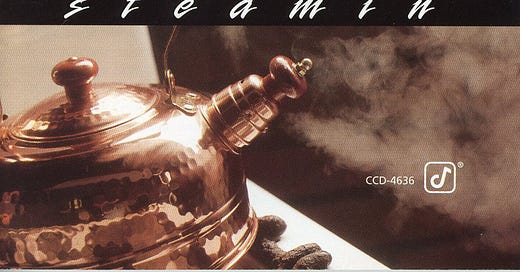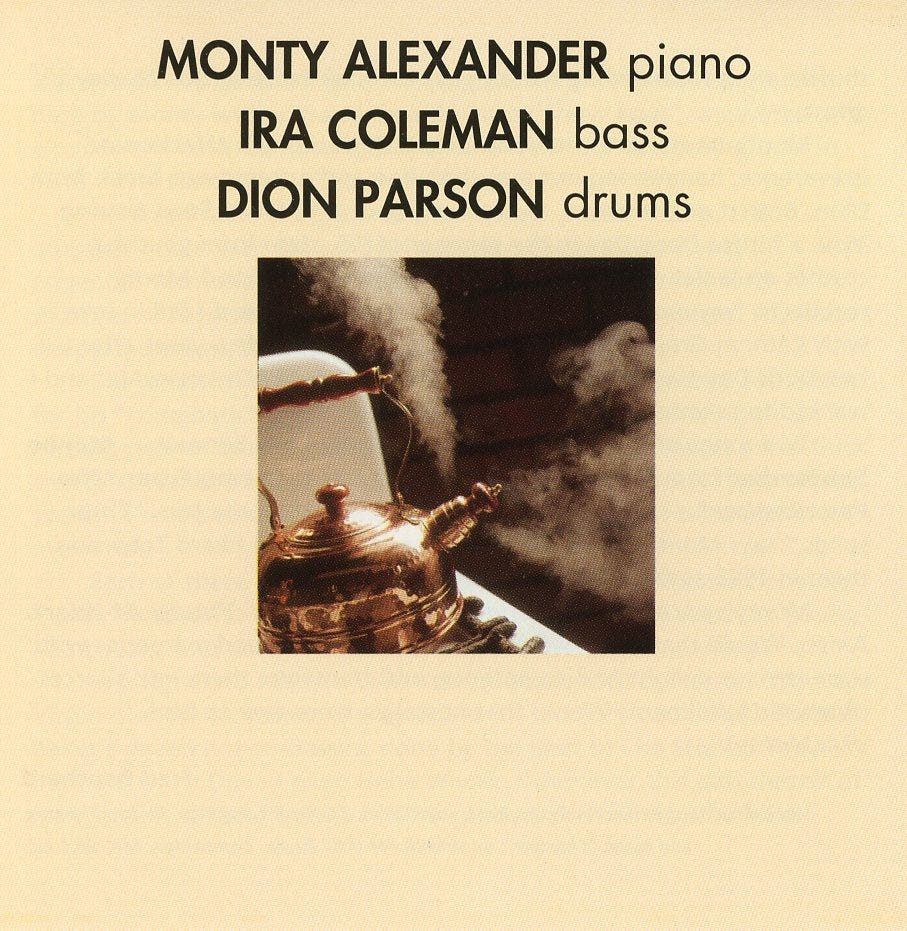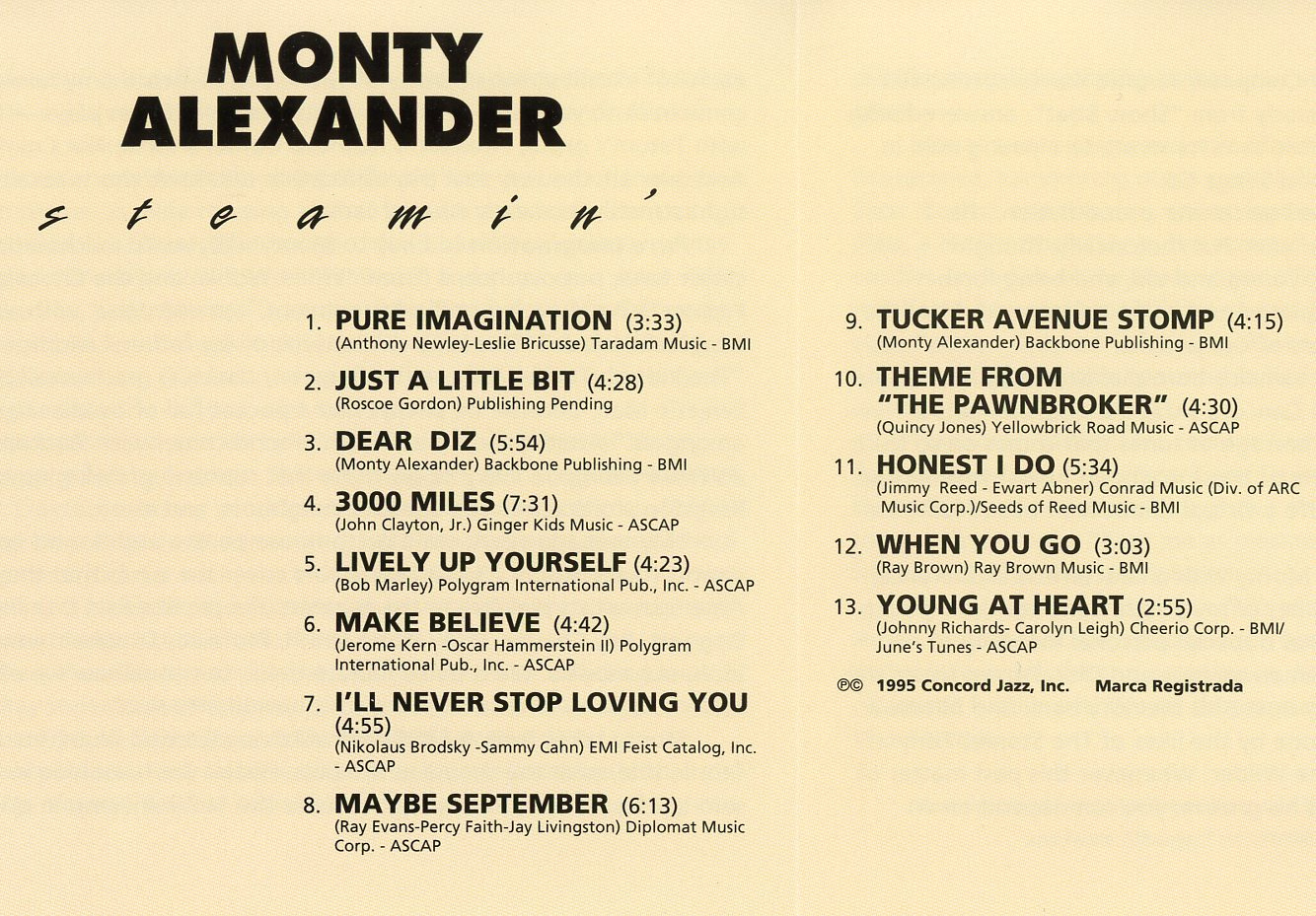Steamin' with the Monty Alexander Trio
© Copyright ® Steven Cerra, copyright protected; all rights reserved.
There is a limit to effectively describing music in words.
So occasionally I enjoy scaling the narratives down by creating posts that simply feature the insert notes from a favorite album along with the full album courtesy of a YouTube link.
Some readers have commented that they appreciate being introduced to new music in this manner and, at the same time, it gives me the opportunity to place the emphasis where it should be - on the music itself.
A word in passing, I am relatively new to blogging on the Substack platform.
As I learn more about the interactive features afforded by Substack, it’s my hope that I will be able to engage with all of you more directly and more frequently in different ways [podcasts, anyone?].
I’m especially grateful to those of you who send a few “schimolies” my way each month to help support the time and effort it takes to research and put together these features.
I return to the music of pianist Monty Alexander quite often because it makes me feel, in a phrase a dear friend often uses - “happy, joyous and free.” And in the Jazz argot, “Steamin’” may be an excellent description of Jazz once Monty Alexander plays it!
See what you think.
© Copyright ® Fred Bouchard, copyright protected; all rights reserved.
“Where do the good songs go? Composer Jerome Kern, represented here by Monty with a grand melody from "Show Boat", answered with eloquent, if fanciful, nostalgia in a tune he wrote as a young man in 1919, "The Land Where The Good Songs Go."
Asked of radio programmers across our proud nation, the question might well fall on deaf ears. Put rhetorically, it might engender memories in all of us, young and old, and bring forth snatches of favorite ditties, misplaced and half-remembered, from the deepest, dustiest, dearest corners of our psyche.
But posed to the ebullient Jamaica-born pianist Monty Alexander for his "comeback" trio date to Concord Jazz, the question gets a rousing peal of laughter and a barrage of tunes that comes on so thick and fast, you know that he's one of those young at heart types whose youthful revels color his adult life a virtual rainbow of beautiful memories.
Each of these tunes," says Monty with characteristic exuberance, "takes me back to significant times of my youth, early teens, or young adult years, and each of them has a special personal meaning."
In a tight trio with Ira Coleman on bass and Dion Parson (from the Virgin Islands) on drums, Monty opens his memory bank and blitzes a baker's dozen not-so-classics, done by the likes of The Stones, Tony Bennett, Doris Day — even Gene Wilder. Whenever this past master of mainstream wit and history hits his groove, you can depend on an earful of excellent tunes, many of which you've heard only rarely but come back to you "like a song." Monty plays — I mean plays — them with Tatum's grace, Peterson's richness, Garner's force, Nat Cole's wit. And over all, the very real trio conception and brisk charts recall the tight structures of early Ahmad Jamal.
Pure Imagination is a key to Monty's keyboard machinations: clever tune, not overheard (from "Willie Wonka and the Chocolate Factory"); he gives it a brilliant treatment, not overdone, with an imaginative fade. "This tune reminds me of my father," Monty states. "The kids on Tucker Avenue (in Kingston, Jamaica) used to call him The Sweetie Man, because he always had a pocket full of candies to pass among us." Another hark back to childhood comes with Tucker Avenue Stomp, a lively 32-bar tune that captures growing up on a Kingston street alive with vendors, neighbors, and music.
"My teenage years, we'd go to house parties and 'sound system' dances," says Monty. "Musicians would cover the tunes that they saw American artists play live in the theaters. People like Fats Domino, Bill Doggett, Ray Charles, Huey Piano Smith, Professor Longhair were our idols, our models. We'd try to imitate them, but somehow we always added our raw Jamaican flavors, so it turned into ska." [Ska is a music genre that originated in Jamaica in the late 1950s and was the precursor to rocksteady and reggae].
Monty takes Just A Little Bit, a Roscoe Gordon blues, for a febrile ride, with the theme in the bass. Hittin' the horsehide in the solo quotes, Ira and Monty then resume the familiar vamp in unison before another leisurely fade. The trio also wails Jimmy Reed's Honest I Do with a dash of Monty's own Jamaican flavors, raw and refined, like rum in a Coke.
Alexander celebrates the great Gillespie with a number that zips through phases as wide-ranging as their careers and as ebullient as their personalities. Dear Diz slips into island backbeat, swings, quotes mightily of "Woody 'n You" and "Manteca," and stops on a dime. "It's my dedication," says Monty, "to a man who was beloved in the world of jazz and blessed throughout the world. Whenever I'd meet Dizzy, he'd sing something silly but nice, and dance a little. It was his way of referring to Jamaica, calypso, and me." [Ed. Note: Dizzy died in 1993, the year before this recording was made.]
Two tunes were penned by exceptional collaborators of Monty who happened to be bassists. The trio swaggers out along 3000 Miles, by John Clayton, a honey of a cruiser, as Ira plugs any potholes. "I hired John and his college mate (drummer) Jeff Hamilton right out of school in 1975. What luck for me! John's rich bass playing improved my piano approach and (made ours) a valuable musical relationship. And he still writes great tunes like this one."
When You Go, by ex-trio-mate Ray Brown, is an affecting love song. "Ray showed me this great tune in 1969," recalls Monty, "and I remembered it all these years. It shows Ray's gentle side."
Monty takes a look homeward at another Kingston son's hit, Lively Up Yourself. After Dion kicks in a backbeat, the trio slides into shuffle; their false ending makes your ear look twice at Bob Marley's ghost.
Monty treats Kern's majestic Make Believe with affectionate irreverence, hammering out a puckish line and a stomp-out break from Dion. Both it and the sure, sweet reading of I'll Never Stop Loving You, a hit for Doris Day in the summer of '55, stem from youthful crushes on ladies of the silver screen. "When I was nine," Monty recollects, "my mother took me to see 'Show Boat', and I fell in love with Kathryn Grayson (who sang 'Make Believe'). A few years after I saw Doris Day sing this beautiful ballad in 'Love Me Or Leave Me' and I wanted to take her home!"
Two songs of lost love covered warmly by Tony Bennett — Maybe September from "The Oscar" and Quincy Jones' Theme From "The Pawnbroker"— receive thoughtful attention from the trio. "These songs," says Monty, "kept me as mesmerized when I heard Tony sing them in 1966 as they do right now."
Monty's encore is two handfuls of solo stride on Young At Heart. Amen. Would that we could all look back on childhood memories with such obvious delight and acceptance, and transform them into sources of artistic fulfillment! Would that nostalgia were ever so hip! Viva Monty!” - Fred Bouchard
At the time of their writing in 1995, Fred Bouchard wrote for Down Beat, Jazz Times, CD Review and the Boston Phoenix, and hosted "Changes" on WMBR-FM (MIT Radio, Cambridge, MA, 88.1 kc).






